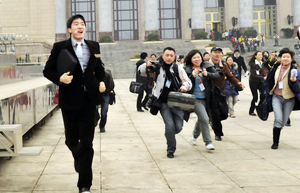Hainan cowpeas price in rebounds after scandal
(Xinhua)
Updated: 2010-03-08 15:16
BEIJING - The purchase price of cowpeas in China's southernmost province of Hainan has rebounded sharply from its lowest level after being pummeled by a pesticide scandal, provincial governor Luo Baoming said here on Sunday.
The average purchase price of cowpeas climbed to 2.6 yuan (38 US cents) per kilogram on Sunday, almost two weeks after it dropped to the lowest level at 0.4 yuan (5.85 US cents) at peak of the scandal, the governor said on the sidelines of the annual session of the National People's Congress (NPC), China's top legislature.
The purchase price used to stand at 3 yuan per kilo, according to Luo.
|
|||||||
He attributed the cowpea prices recovery to the provincial government's remedy actions to rectify the pesticide and agricultural markets and improve testing from farm to market.
"We have conducted stricter and more thorough tests on agricultural products sold to other regions and guarantee their quality," Luo said.
The province took emergency measures to restore consumers' confidence in the vegetables grown in the island, including setting up 24-hour cowpea checkpoints at the island's harbors and launching a comprehensive inspection on the use of pesticides.
Last month, authorities in Wuhan, capital of central China's Hubei province, found about 3.5 tons of cowpeas from Hainan were treated with isocarbophos, a pesticide whose use is banned on fruits and vegetables.
Several provinces in southern and eastern China later reported more finding of the tainted cowpeas being sold in their markets, leading to a crisis in confidence on the agricultural products grown on the tropical island.
There have been no reports that people were sickened by the contaminated cowpeas.




